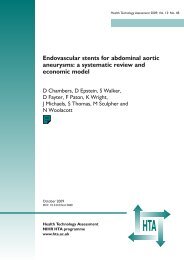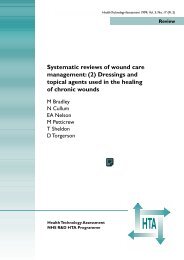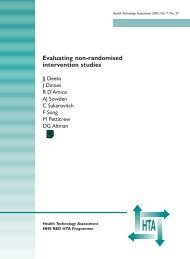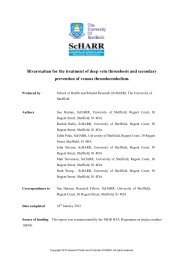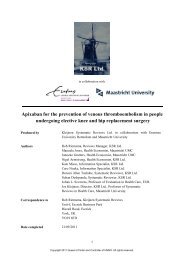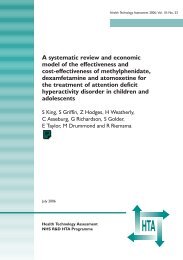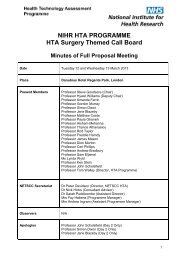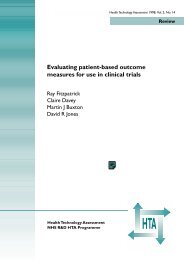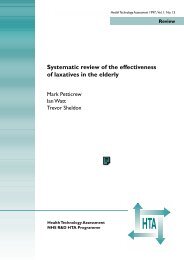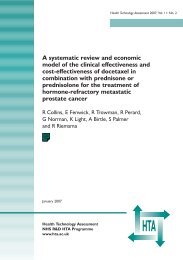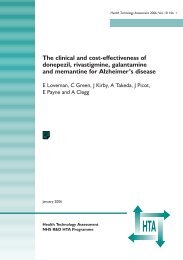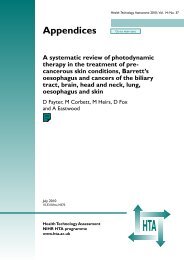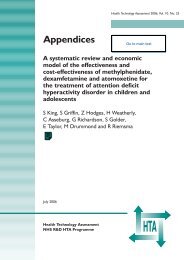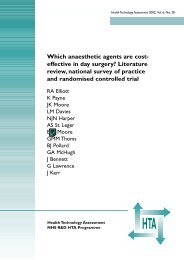How far does screening women for domestic (partner) - NIHR Health ...
How far does screening women for domestic (partner) - NIHR Health ...
How far does screening women for domestic (partner) - NIHR Health ...
You also want an ePaper? Increase the reach of your titles
YUMPU automatically turns print PDFs into web optimized ePapers that Google loves.
DOI: 10.3310/hta13160 <strong>Health</strong> Technology Assessment 2009; Vol. 13: No. 16<br />
© 2009 Queen’s Printer and Controller of HMSO. All rights reserved.<br />
Chapter 9<br />
Is <strong>screening</strong> <strong>for</strong> <strong>partner</strong> violence acceptable to<br />
health-care professionals? (Question VI)<br />
Qualitative studies<br />
We identified 10 journal articles and one UK<br />
Home Office report reporting the attitudes of<br />
health-care professionals towards <strong>screening</strong> <strong>for</strong><br />
<strong>partner</strong> violence. For details of study design and<br />
quality scores see Appendix 9.1. Four studies were<br />
conducted in the USA, three in the UK, two in<br />
Sweden, one in Australia and one in New Zealand.<br />
There are six studies exploring midwives’ attitudes,<br />
one about nurses, two about physicians, one about<br />
nurses and mental health service providers, and<br />
one about a range of professionals. The total<br />
number of recruited health-care professionals was<br />
446, ranging between 8 and 124 per study. The<br />
methodological quality score assessed by CASP was<br />
between 19 and 37, with most of the studies scoring<br />
more than 31.<br />
First-order constructs<br />
We identified 12 first-order constructs concerning<br />
health-care professionals’ views about <strong>partner</strong><br />
violence <strong>screening</strong>. There were variations between<br />
studies regarding the first-order constructs but<br />
there were no systematic differences in relation to<br />
country or health-care setting.<br />
1. Screening <strong>for</strong> <strong>partner</strong> violence is acceptable to<br />
some health-care professionals<br />
Edin and Högberg found that the idea of asking<br />
all pregnant <strong>women</strong> questions about abuse, as<br />
is done with respect to smoking and alcohol,<br />
was acceptable to almost all the midwives they<br />
interviewed. 175 Stenson and colleagues also<br />
found that health-care professionals generally<br />
consider routine questioning about <strong>partner</strong><br />
violence acceptable. A typical statement from their<br />
in<strong>for</strong>mants: ‘Regarding certain questions, routine is<br />
very important; to raise them at this point in time<br />
because then you know it will get done’. 176<br />
2. <strong>Health</strong>-care professionals felt that they have a<br />
responsibility to screen <strong>for</strong> <strong>partner</strong> violence<br />
It was felt that all health professionals need to be<br />
aware of the issues involved and share responsibility<br />
<strong>for</strong> detecting <strong>partner</strong> violence and supporting the<br />
<strong>women</strong> concerned. 177,178 Screening was seen as an<br />
expression of wanting to make a difference to the<br />
social issue of <strong>partner</strong> violence. 179<br />
3. Asking about abuse helps remove stigma attached<br />
to <strong>partner</strong> violence and indicates openness to the<br />
issue<br />
Edin and Högberg reported that one justification<br />
<strong>for</strong> <strong>screening</strong> expressed by their midwife<br />
in<strong>for</strong>mants was that asking every pregnant woman<br />
in their antenatal clinics questions about abuse<br />
‘would play down the issue; no one would need to<br />
feel singled out when confronted with a sensitive<br />
question’. 175<br />
4. Screening <strong>for</strong> <strong>partner</strong> violence is an indicator of<br />
good care<br />
Some accident and emergency staff thought that<br />
asking all <strong>women</strong> about abuse was an indication of<br />
good care. 180<br />
5. Screening <strong>for</strong> <strong>partner</strong> violence is conditioned by<br />
the way professionals ask and timing is important <strong>for</strong><br />
<strong>screening</strong><br />
Timing of <strong>screening</strong> was considered important<br />
by in<strong>for</strong>mants. Screening during routine medical<br />
intake, such as during the triage process, was<br />
considered inappropriate. 120 Concerns were<br />
raised about patients with a range of conditions:<br />
drug and alcohol intoxication, acute psychosis,<br />
active labour, stroke, heart attack or other acute<br />
conditions. These groups might be unable to<br />
respond appropriately to <strong>screening</strong> or their<br />
priority is immediate medical management. 181<br />
The in<strong>for</strong>mants of Edin and Högberg suggested<br />
the issue could be brought up during the first<br />
antenatal visit of the <strong>women</strong> or at a later visit. 175<br />
In the study by Stenson and colleagues, midwives<br />
did not perceive questions about violence as being<br />
more delicate than many other questions that are<br />
ordinarily asked in antenatal care. 176 Others said<br />
that ‘they did not feel it to be a problem to ask,<br />
although they reported different situations when<br />
they found questioning about abuse inappropriate’.<br />
Although different opinions were expressed<br />
regarding <strong>screening</strong>, some midwives suggested<br />
the use of routine questions; other in<strong>for</strong>mants<br />
63



